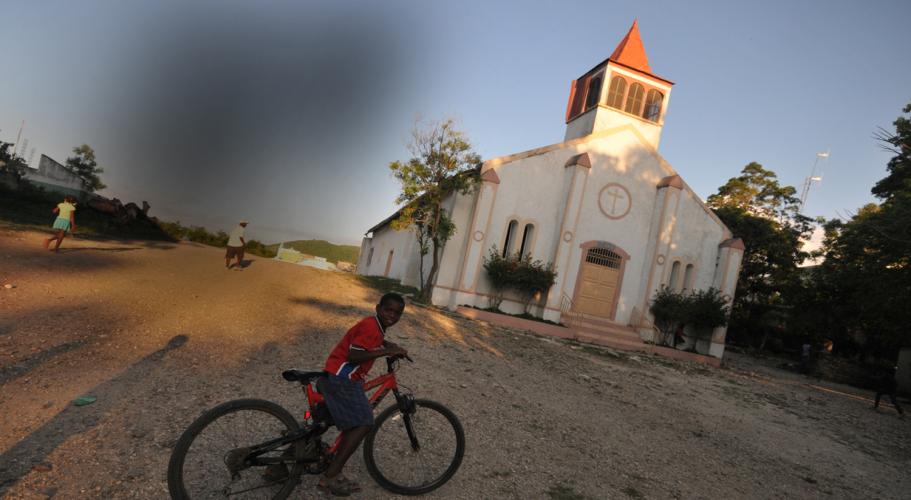“We value making patients feel welcome.”
Your donation will help Nurse Laguerre provide the highest-quality care to every patient in need.


Dr. Paul Farmer is a HEI/SBH board member, in addition to being a co-founder of the organization Partners in Health and a luminary in the field of public health. This eloquent essay speaks not only to why public health is vital, but also to our mission at HEI/SBH.
The essay originally appeared in Sojourners and on the Partners In Health website. Thank you to Dr. Farmer for permission to repost.
Two of my greatest teachers were Latin American men, both ordained as Catholic priests. One, Archbishop Oscar Romero, was assassinated in 1980. I never met him, being a 20-year-old American who’d never set foot in El Salvador or anywhere else in Latin America. But Romero made me, a lapsed Catholic, wonder why his views—our views, if Christian social teaching means anything at all—would be viewed with murderous hostility by the Salvadoran elite. After all, it was all right there in the Book. Wasn’t it?
The truth was, I didn’t know. Was it worth looking at books about these matters? That’s what we believed in medical school: Look it up! So Romero led me to the second of these teachers who, I’m happy to say, is alive and well and living (mostly) in Lima, Peru. Gustavo Gutiérrez, a diminutive and humble Dominican priest and a great friend of Romero’s, taught me through his books, from The Power of the Poor in History to We Drink from our Own Wells, and later through his friendship and his almost mystical (to me, in any case) optimism.
Over the course of my 20s, the slender, frayed thread of my own faith, which I had believed cut, slowly came back into view. There was a filament a bit stronger than imagined, made visible in part by my Haitian hosts and patients and friends, and in part by Catholic social activists working against poverty in settings as different as tough neighborhoods in Boston, the farms of North Carolina, and the slums of Lima.
Some were nuns or priests, some were engaged laity, from many professions. Most were people living in and struggling against their own and others’ poverty. Their activism taught me a lot about a space in the Catholic Church I’d not seen clearly before, and about the promise of long-term engagement in the monumental struggle against poverty and discrimination in all its forms. That includes gender inequality, no stranger to the institution. Most of the most inspiring activists were women.
Now there is a third Latin American priest on my mind. And happily for our troubled but beautiful world, both Archbishop Romero and Father Gutiérrez are on Pope Francis’ mind. You can’t be a Jesuit from Argentina and not have liberation theology in your thoughts. But now the man is the pope in Rome, and progressive, indeed radical, ideas have not always found warm welcome there. That may be changing, just by Francis’ words and actions, which have included how best to honor Romero’s memory and a recent consultation with Father Gutiérrez. Just knowing of the recent meeting between the two South Americans, knowing they said a Mass together, warmed my heart, and not just “for the good of all the Church” (in the words of that liturgy). It warmed my heart, and wove those strings tighter, because the secular world also needs liberation theology.
Over the past 25 years, I’ve not learned much theology (medicine and anthropology were more than enough for me), but some of us have taken a number of key concepts from liberation theology and applied them in medicine. Let me comment on three that have been important to the work of Partners In Health, an organization I cofounded to make “a preferential option for the poor in health care” in settings ranging from rural Latin America (Haiti, Guatemala, Mexico) and Africa (Rwanda, Malawi, Lesotho) to areas of urban poverty (Peru, the United States) and even into the prisons of Siberia. Gutiérrez has written books about all of these ideas and has sought to teach and learn about them through his own ministry.
The first notion is the preferential option for the poor. Any serious examination of epidemic disease has always shown that microbes also make a preferential option for the poor. But medicine and its practitioners, even in public health, do so all too rarely. Imagine how much unnecessary suffering we might collectively avert if our health care and educational systems, foundations, and nongovernmental organizations genuinely made a preferential option for the poor?
The second is the notion of structural violence. Sure, bad things happen. But they don’t often happen randomly. Violence is done to some people in this world by poverty, racism, gender inequality, homophobia, and xenophobia. Just as this violence, which Gutiérrez and others term structural violence or “structural sin,” can be institutionalized through unjust social arrangements, so too can it be undone with the help of more just ones.
The secular world needs to understand that what would “free us from all anxiety” is opening up to the poor and otherwise marginalized the chance to flourish. This cannot happen if there is hunger, unfair political arrangements, ongoing assaults on the environment, and no safety net to protect the sick, the unemployed, and the frail. The current rules of modern capitalism cannot rid us of structural violence any more than wars or other forms of “event violence” can. But understanding how the social worlds in which we live are constructed might help us to do so, as can the mystery of hope.
The third notion is accompaniment. The power of this simple idea, a staple in liberation theology, came to me in contemplating patients facing both poverty and chronic disease. They missed appointments, didn’t fill prescriptions, didn’t “comply” with our counsel. And this was true in every country in which I’ve worked. But when we began working with community health workers to take care of patients, the outcomes we all sought were much more likely to happen. Instead of asking “why don’t patients comply with our treatments?” we began to ask, “How can we accompany our patients on the road to cure or wellness or a life with less suffering due to disease?” Again, the notion would be welcome in the world beyond the church: How many institutions, including those responsible for foreign aid, desperately need to replace time-limited, contractual, and almost invariably inegalitarian arrangements—the aid worker and the aid recipient—with genuine accompaniment and solidarity? My guess: almost all of them.
Just these notions alone are reminders of an institution stretching back 2,000 years that can still nurture leaders such as Archbishop Romero and Father Gutiérrez. It’s my fervent wish that the church led by Pope Francis will canonize the first man and continue to listen to the second. We can all learn from both of them, just as they have learned by listening to the poor and oppressed.
Paul Farmer is the Kolokotrones University Professor at Harvard University and co-founder of Partners In Health. His most recent book is In the Company of the Poor: Conversations with Dr. Paul Farmer and Fr. Gustavo Gutiérrez (Orbis Press). He has worked as an infectious disease physician in Haiti, Peru, Rwanda, and Boston.
Your donation will help Nurse Laguerre provide the highest-quality care to every patient in need.
